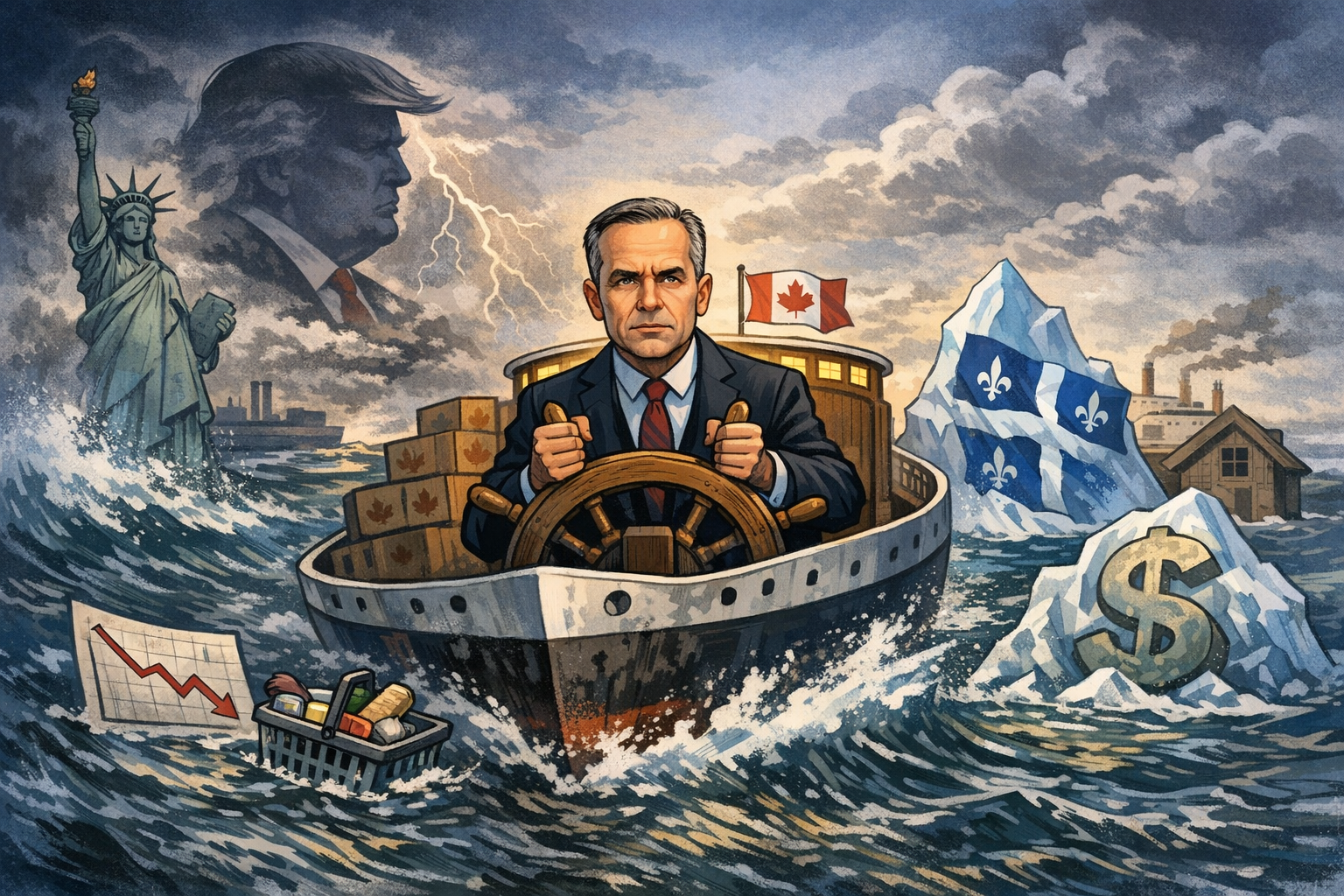The state of the Conservative Party brand at the end of 2019
December 30, 2019
The research for this brand assessment was conducted by Abacus Data CEO David Coletto with advice and insights from Kate Harrison, a VP at government relations firm Summa Strategies and Dennis Matthews, a VP at Enterprise Canada and a former staffer to Prime Minister Stephen Harper and Conservative Party leader Rona Ambrose.
As 2020 approaches and the Conservative Party prepares to elect a new leader following the sudden resignation of Andrew Scheer, we thought it would be an interesting exercise to conduct a brand assessment of the Conservative Party using a few of the tools we often use to measure reputation and brand positioning for leaders, companies, sectors, associations, and consumer brands.
This is by no means an exhaustive audit of the Conservative Party brand but we think it does offer plenty of insight into how supporters, accessible voters and the general public view the Party as well as its primary competitor, the Liberal Party.
THE CONTEXT
The Conservative Party finds itself at a low point in both vote intention and accessible voters. Currently, 44% of Canadians say they would consider voting Conservative (down 4-points since the start of the 2019 election campaign). 30% of decided voters would vote Conservative today, including only 31% of Ontarians, 18% of Quebecers, and 18% of those aged 18 to 29. The Conservative support base is the oldest of the main parties with 62% aged 45 and over.

The party’s support is concentrated in Western Canada, with 41% of current supporters living in one of the four western provinces; 10-points higher than the proportion of the actual population in the region.
It’s also worth stating that the Conservative and Liberal parties have about equal support across the country and so comparing how people feel about the two parties and comparing survey results works well as one group is not larger than the other in the electorate.

What follows is a summary of the most pertinent findings from the study. The survey was quite extensive, so we have focused on what we believe matters most to understanding where the Conservative Party brand is today and where the opportunities are to expand its audience and appeal in the lead up to the next election.
EXHIBIT A: The top of mind associations with the Conservative Party reveal a brand that is considered old, traditional and closed.
When we ask respondents to give us three words they would use to describe the Conservative Party today, the three most frequent responses include old, tradition, and closed.
Some of the most common negative frames used to describe the party are:
• Out of date, old, backward, and traditional
• Uncaring, selfish, arrogant, and mean
• Corrupt, crook, liars, dishonest, and untrustworthy
• Racist, bigot, narrow-minded, close-minded
• Elite, elitist, wealthy, greedy, and rich
Positive frames include:
• Future, confident, and trustworthy
• Fair, focused, and reliable
• Realistic, smart, and strong
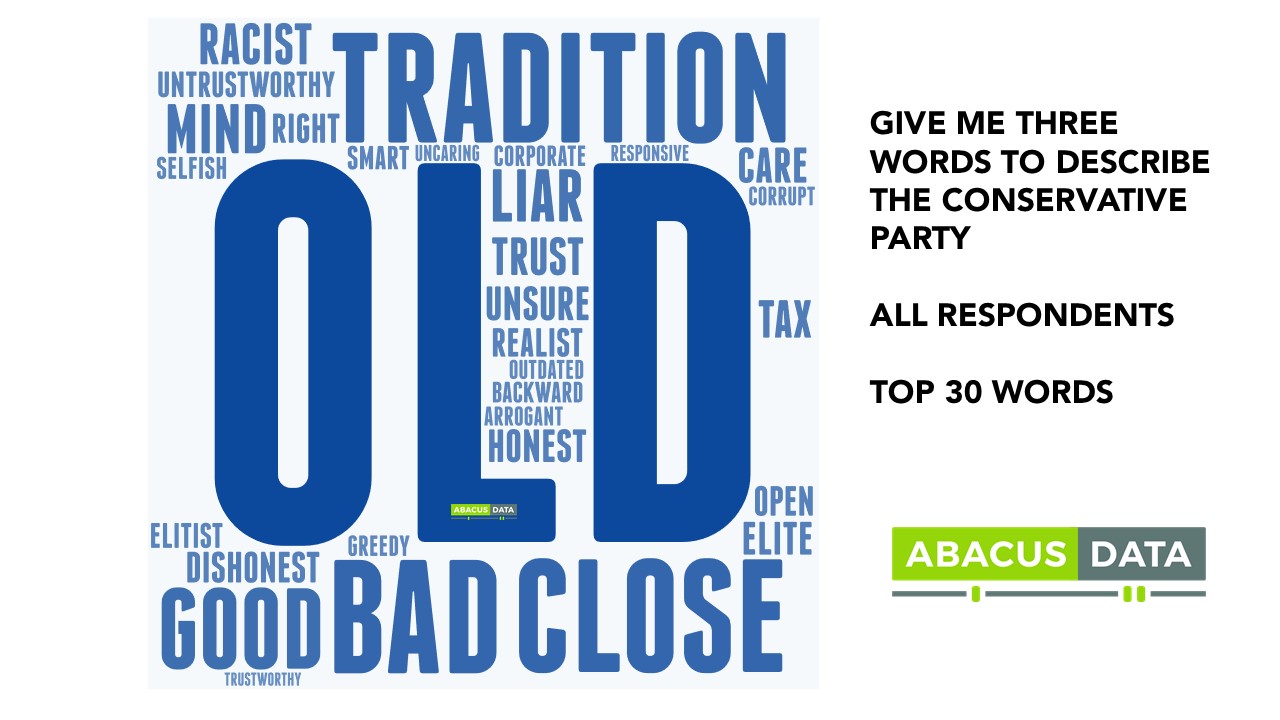
Obviously, for those who voted Conservative in October, the view of the Party is quite different from the general public. Conservative voters describe the party as trusting, caring, honest, realistic, and good. Some describe it as old, untrustworthy, but the negative mentions are quite rare among supporters.
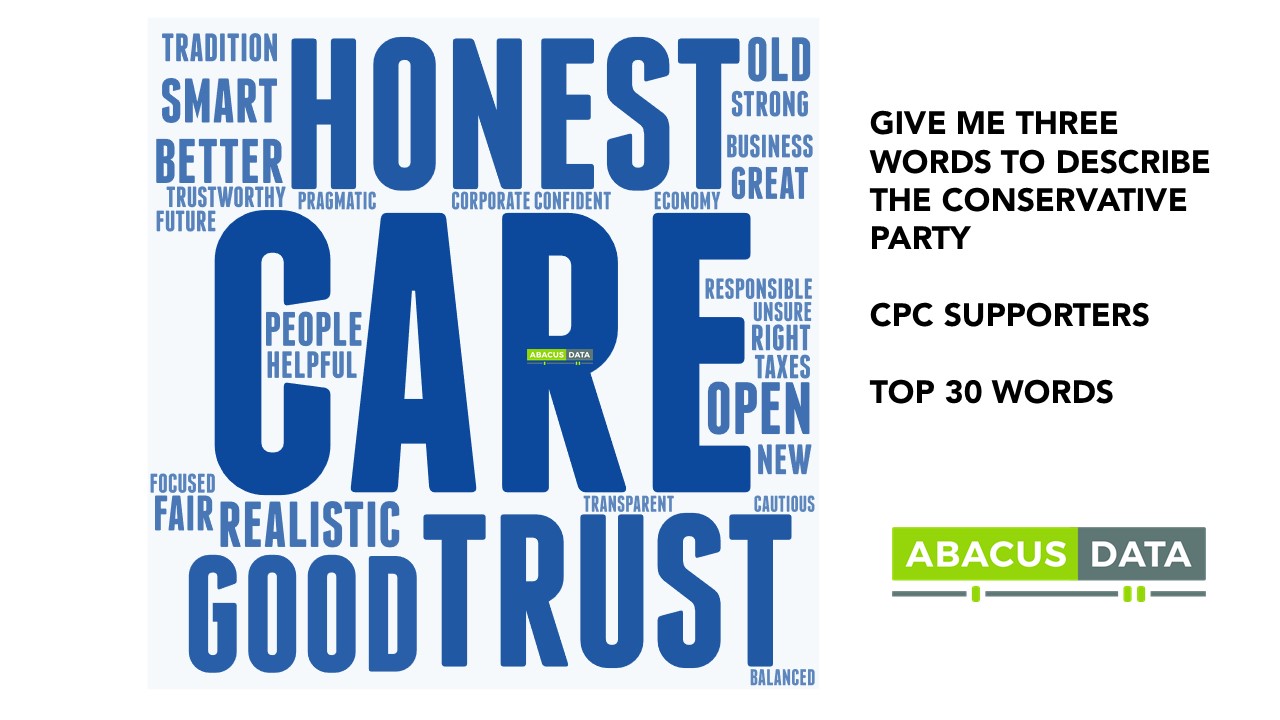
Most striking is how accessible Conservatives describe the party. These are individuals who tell us they would consider voting Conservative in the future but wouldn’t vote for the party right now. The perception of these potential supporters is very similar to the general public’s (i.e., they see the party as old, traditional, close-minded, bad, elitist, and untrustworthy.)
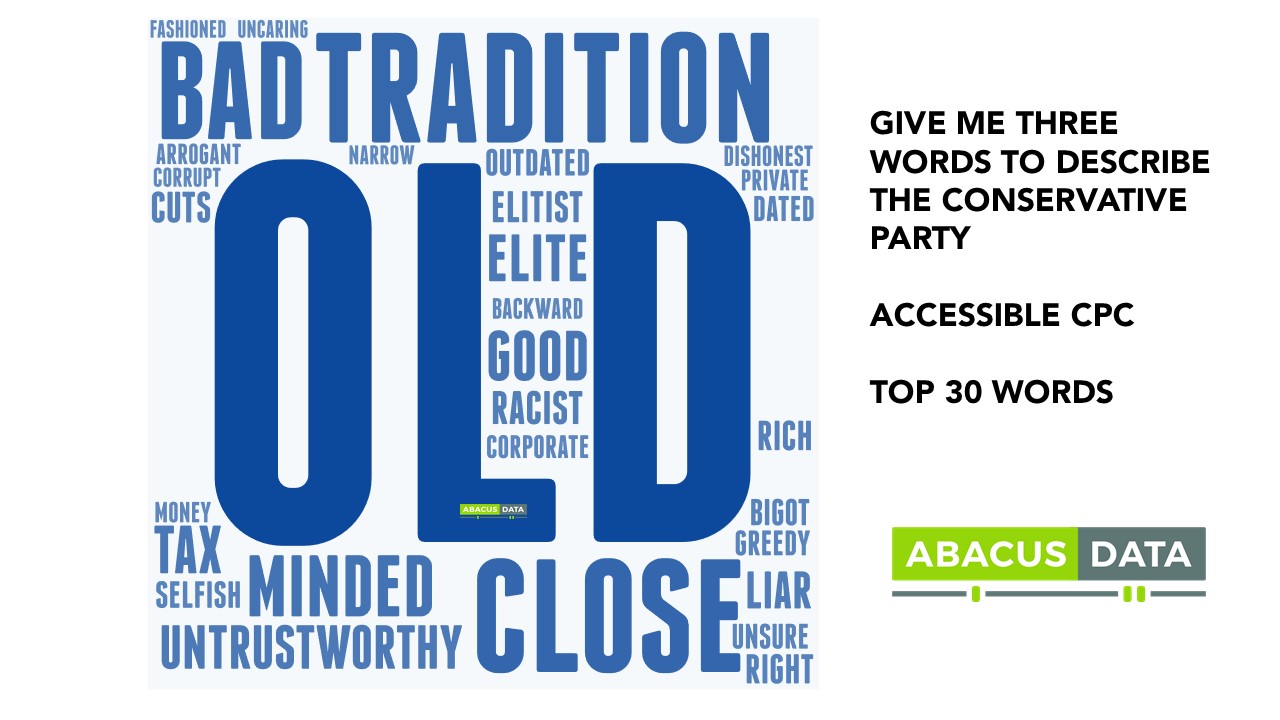
For comparison, we asked respondents to do the same thing for the Liberal Party. Although the Liberals have their fair share of negative associations (liar, dishonest, corrupt, untrustworthy), the most frequently mentioned term from the general public was open.
A close comparison of the Conservative and Liberal word clouds shows a wide difference in perspective. While the Liberal Party is seen as open, diverse, good, and ambitious, the Conservative Party is regarded as old, traditional, and close-minded.

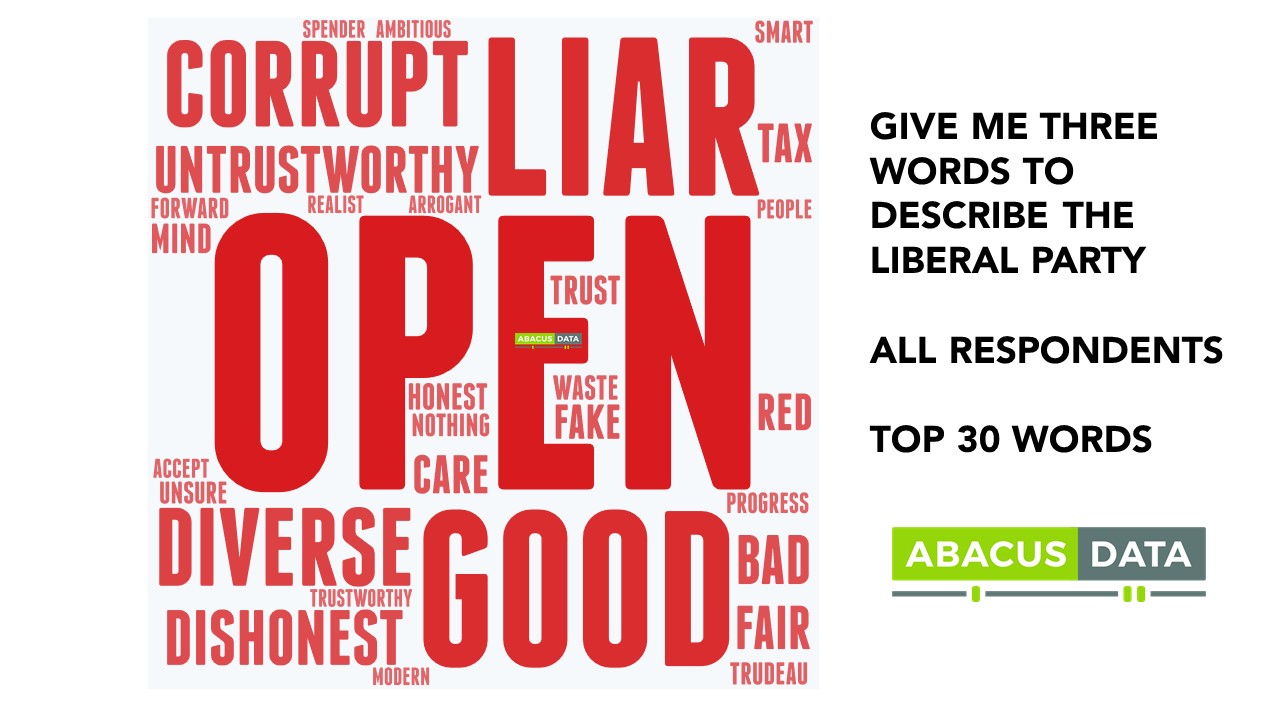
EXHIBIT B: More Canadians associate the Conservative Party with oil, farming, religion, and the military and many don’t associate it with equality, women, climate, and diversity.
We showed respondents several images and asked them to what extent the image represents both the Conservative and Liberal Party. Below is a gallery of the images we showed respondents.
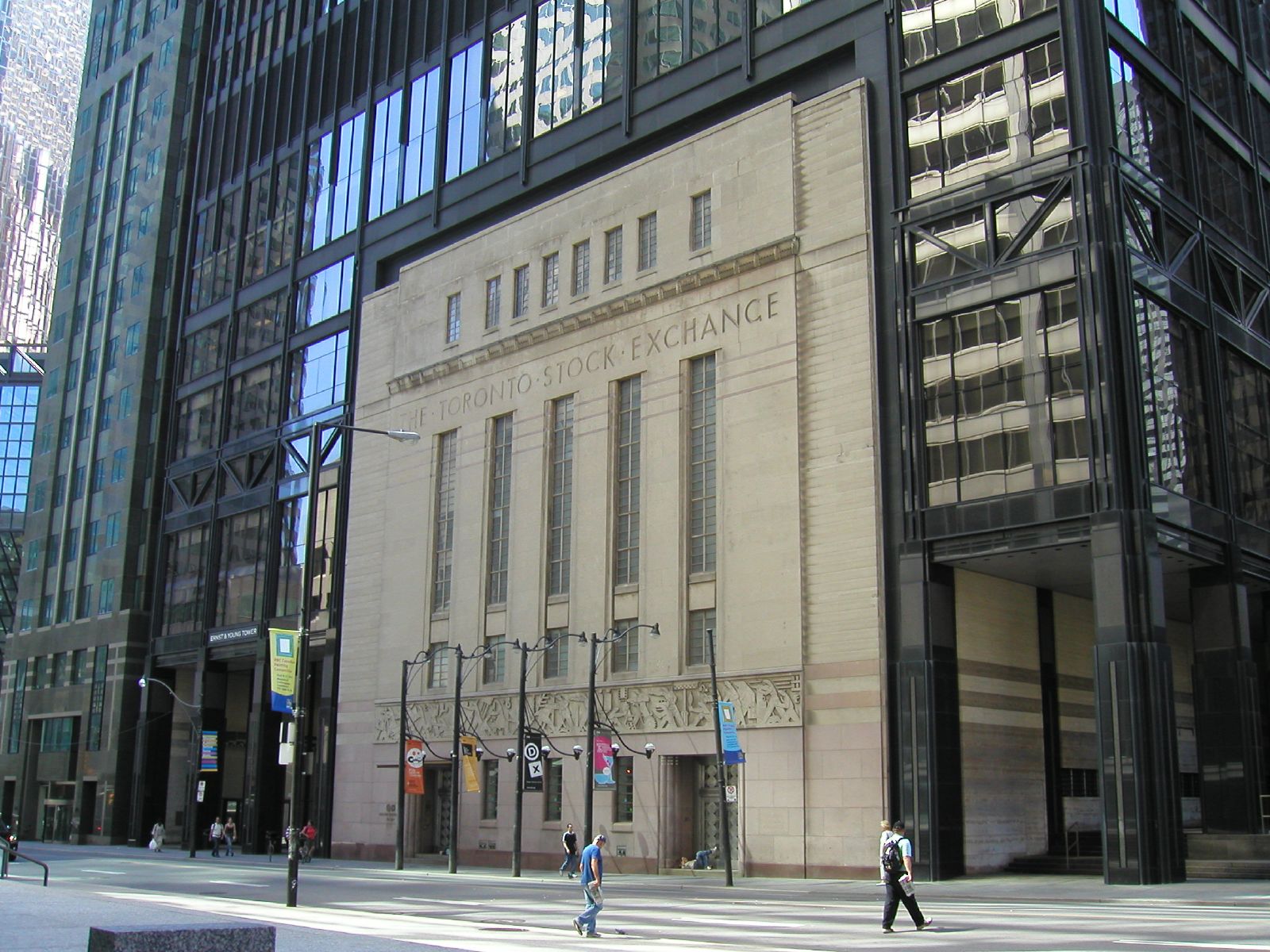

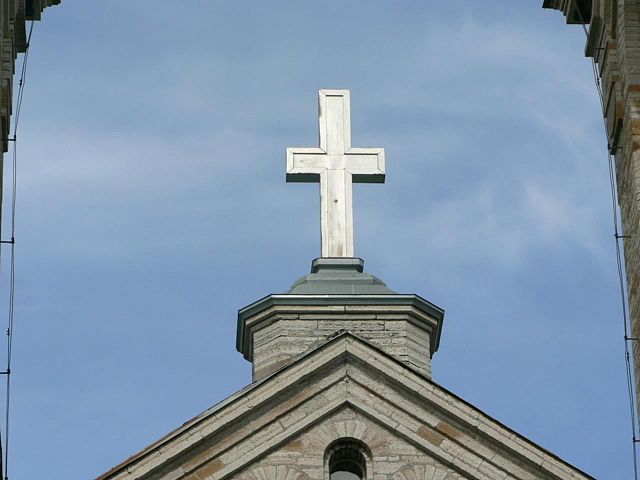






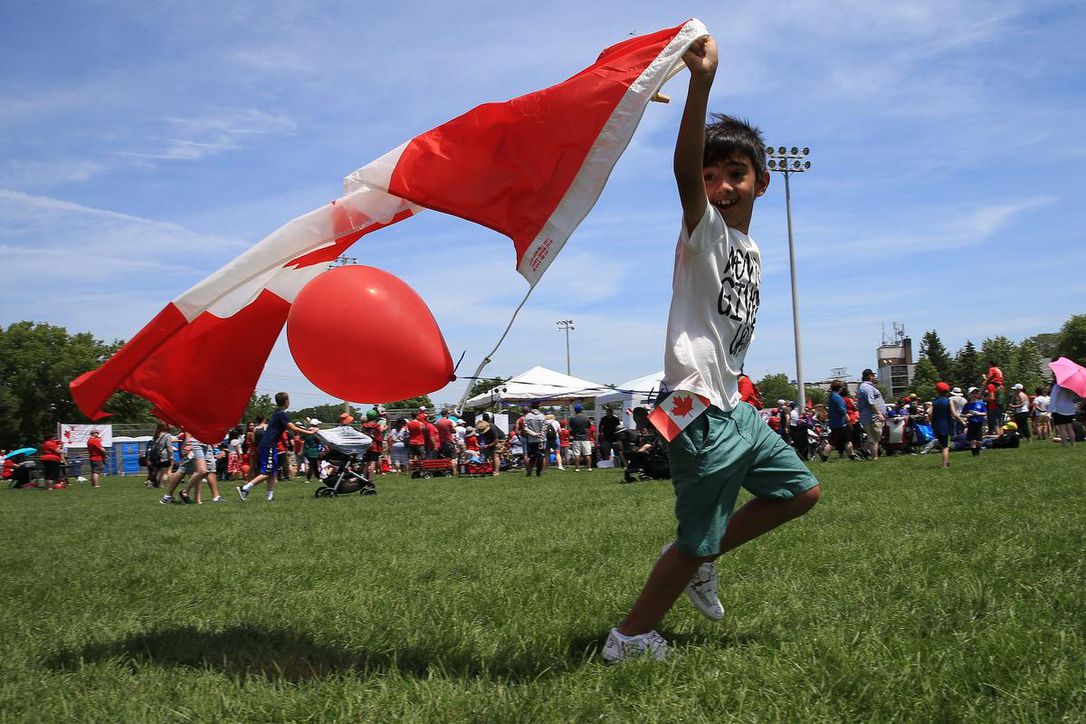


We chose images that we think represent different attributes, values, and emotions that people may or may not associate with a political party.
Canadians clearly distinguished between the Conservative and Liberal brands. The Conservative Party was much more likely to be associated with religion, farming, the military and most strikingly an oil derrick. In fact, 38% of Canadians said the image of the oil derrick represents the Conservative Party a lot – the strongest association between an image and a party we tested.
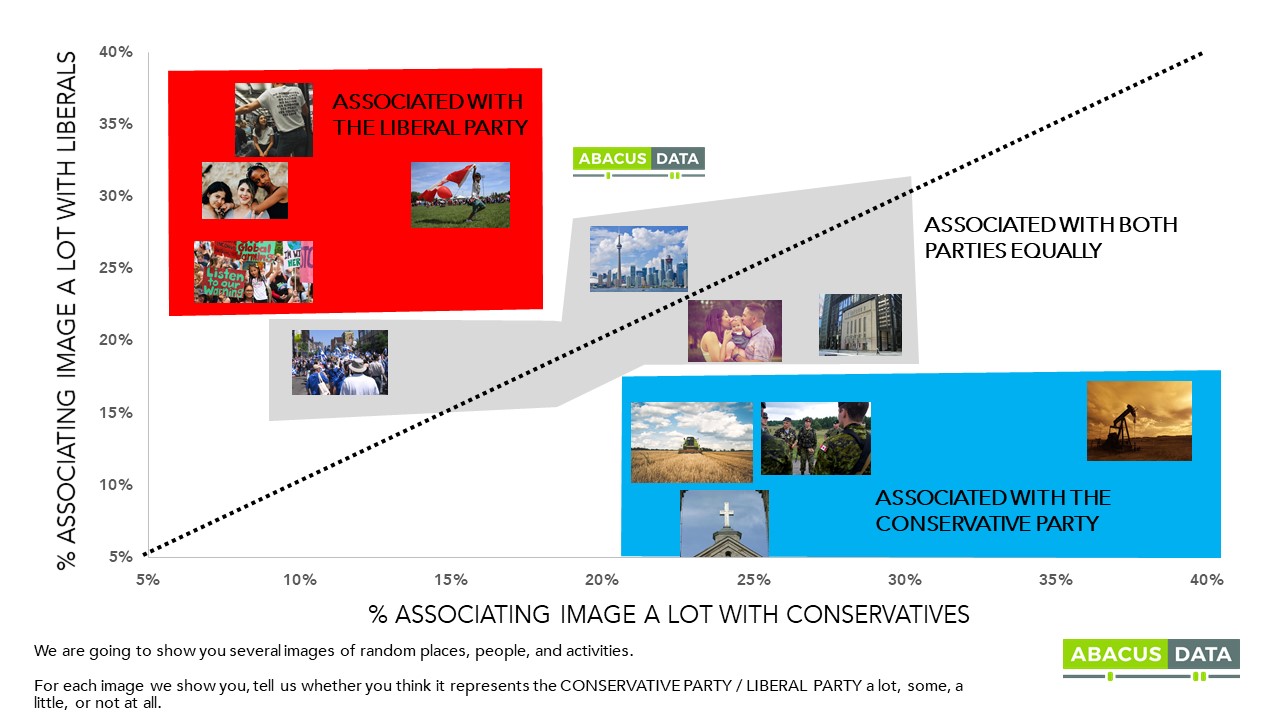
At the same time, many people felt that many of the images associated with the Liberal Party (climate march, equality, and young women) were not at all associated or representative of the Conservative Party.
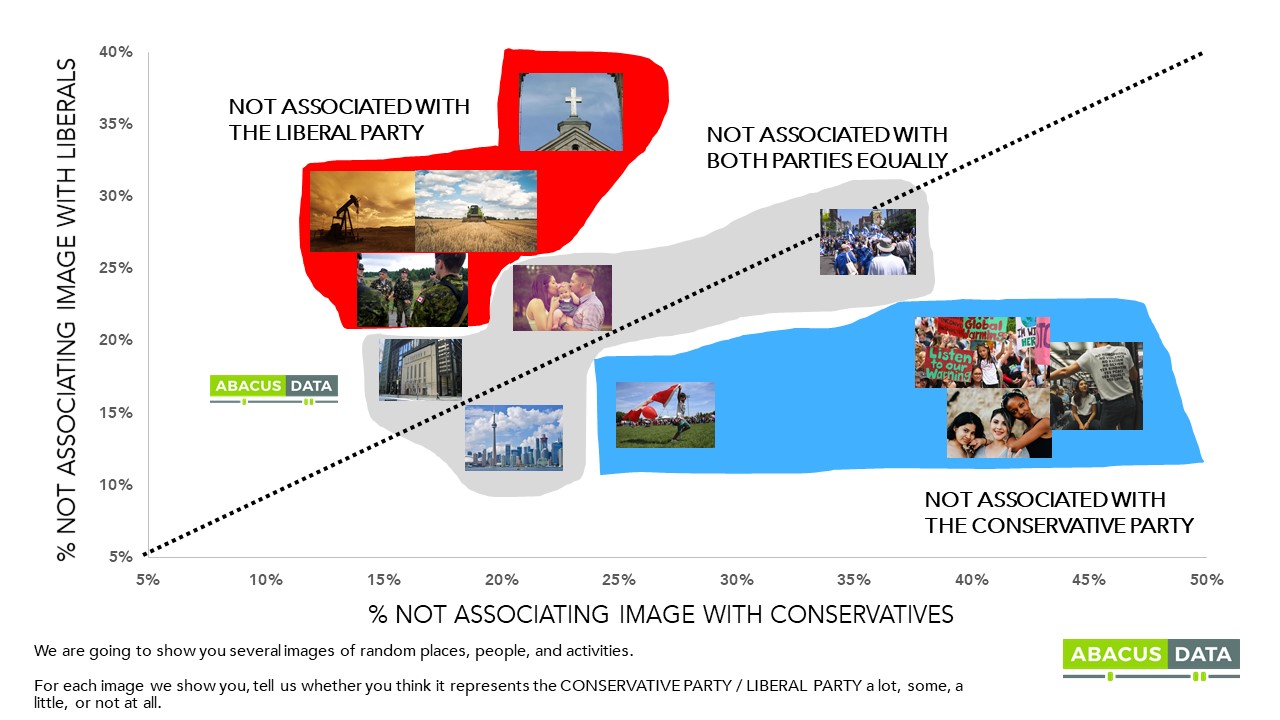
Some additional insights from this exercise:
• More people associated the image of the oil derrick with the Conservative Party than any other image we tested. 38% of all respondents thought it represents the Conservative Party a lot compared with 14% who felt the same about the Liberal Party. Those in SK/MB (55%), Alberta (45%), and BC (46%) were most likely to associate the image with the Conservative Party. Those respondents who would not consider voting Conservative were as likely to associate the party with the oil derrick as those open to voting Conservative.
• At the same time, only 8% felt that the image of the climate protest represented the party a lot with another 22% saying it represented the party somewhat. 44% overall thought it did not represent the party at all. 56% of inaccessible respondents felt the image did not represent the party at all. 48% in Ontario and 40% in Quebec felt the same way.
• Few (9%) associated the Conservative Party with the image of a young man on a subway wearing a shirt expressing support for equality, kindness, and peace. Although 58% of those who would not consider voting Conservative felt the image did not represent the party at all, only 16% of accessible Conservatives felt it represented the party a lot
EXHIBIT C: Canadians see the Conservative Party as tough as nails, skeptical, close-minded, and restrained rather than ambitious.
Respondents were shown a pair of phrases and asked to select which one best describes the Conservative Party today. Overall, respondents were more likely to describe the party as:
• Accepting diversity (77%) rather than celebrating diversity (23%)
• Traditional (78%) rather than creative (22%)
• Skeptical (66%) rather than trusting (34%)
• Tough as nails (66%) rather than good-hearted (34%)
• Close-minded (64%) rather than open-minded (36%)
• Polished (58%) rather than authentic (42%)
• Restrained (55%) rather than ambitious (45%)
Equal numbers felt the party was confident as felt it was cautious.

Differences between how current supporters and accessible voters feel about the party is quite instructive.
• Both supporters and accessible voters feel the party accepts diversity rather than celebrates it.
• Supporters are more likely to describe the party as “good-hearted” while accessible voters are more likely to think it’s “tough as nails”
• 78% of supporters feel the party is authentic compared with only 33% of accessible voters.
• 72% of supporters feel the party “keeps its promises” while 38% of accessible voters feel the same way.
• 71% of supporters think the party is “trusting” rather than “skeptical” while only 39% of accessible voters feel the same way.
• Most noteworthy, 82% of supporters describe the party as “open-minded” compared with only 38% of accessible voters who think of the party in the same way.

And when we compare how people feel about the Conservative Party to how they feel about the Liberals, we similar perceptual differences as some of the other exercises.
• Liberals celebrate diversity while Conservatives accept it. While 77% believe the Conservative Party “accepts diversity” rather than “celebrate diversity”, only 38% feel the same way about the Liberal Party.
• Conservatives are tough as nails while Liberals are good-hearted. 66% describe the Conservative Party as “tough as nails” rather than “good-hearted” while 35% feel the same way about the Liberals.
• Conservatives are restrained while Liberals are ambitious. 55% describe the Conservatives as restrained rather than ambitious while 35% describe the Liberals in the same way.
• Conservatives are traditional while Liberals are creative. 78% describe the Conservative Party as traditional rather than creative while only 45% feel the same way about the Liberal Party.
• Conservatives are close-minded while Liberals are open-minded. 60% describe the Liberal Party as open-minded compared with 36% who feel the same way about the Conservatives.
• Conservatives are realistic while Liberals dream big. 54% feel the Conservative Party is more realistic than big dreamers. 36% describe the Liberal Party in the same way.
THE UPSHOT
At the end of 2019, the Conservative Party of Canada finds itself without a leader and a differentiated yet negatively oriented brand.
The party is seen as tough, realistic, and restrained. It’s associated with oil and religion and not associated much with diversity, equality, or climate change. People describe it as old and traditional with a closed-mind and cautious attitude.
Where the Liberals are seen as open, creative, and ambitious, the Conservatives are seen as closed, traditional, and tough as nails. The Liberal Party dreams big, while the Conservative Party restrains change.
At the same time, the party does not have an advantage on the Liberals when it comes to authenticity, concern about people over corporations, or whether it is down to earth or elitist.
While the Liberal Party is challenged by perceptions of dishonesty and inauthenticity, the Conservatives offer little to counter that. They are not seen as more authentic or more honest than the Liberals.
According to David Coletto: “At a time when people are looking for their elected leaders to offer solutions to many of the big issues our world faces, the Conservative Party today appears to be restrained and unambitious. It feels out of touch, old, and too traditional to many voters, including many who say they are open to voting for it.
It appears to only tolerate differences, is strongly associated with the oil and gas sector (which is a strength in Alberta but a weakness in BC, Ontario, and Quebec) and not associated with diversity, equality, or climate action.
While being seen as realistic and restrained can be a virtue, the party’s perceived lack of ambition is a challenge. To expand its audience, the party must do more to appear in touch with the times, to embrace differences and defend equality, and to appear to be concerned about the big issues most voters care about and have solutions with appear ambitious enough to solve them.
According to Kate Harrison: Word associations like old, tradition and close-mindedness aren’t likely to take Conservatives by surprise, but they should give pause for Conservative leadership hopefuls. Why? Because challenging these negative frames is necessary to convince more Canadians to vote Conservative in the next election.
This doesn’t mean twisting the Party into a pretzel to be all things to all people. But it does mean playing to our existing strengths (on values like honesty and competency) while bridging the gap for accessible voters who are on the fence on whether or not Conservatives are authentic, ambitious, and accepting enough to earn their support.
Perhaps the biggest area of opportunity for Conservatives lies in defining how they would support middle-class families; specifically, those in urban and suburban communities. The data presented here indicate that voters are evenly split when associating an image of a young family as inherently Liberal or Conservative; an image of the city of Toronto draws equally mixed results. Conservative leadership aspirants who are serious about becoming Prime Minister should be thinking now about not just the policies, but the tone and narrative needed to garner support from these voters next go around.”
According to Dennis Matthews: “Conservatives need to renew the brand in a way that feels welcoming to a broader audience and more contemporary to the times. Too few voters are considering Conservatives in the first place because the brand has become a barrier. This brand problem is particularly acute in the parts of the country that are growing and changing the fastest: suburban and urban Canada.
Going forward, Conservatives need to find a way to renew their brand promise in a way that looks to the future with new and creative solutions to the problems we face as a country.
All this must be done in a way that reclaims the high ground from the liberals on being authentic, focused on everyday working people and their families and aligned to the concerns of our times.”
David Coletto is CEO of Abacus Data. Kate Harrison is Vice President at Summa Strategies. Dennis Matthews is Vice President, Marketing and Communications at Enterprise Canada.
METHODOLOGY
Our survey was conducted online with 1,500 Canadians aged 18 and over from December 10 to 12, 2019. A random sample of panellists was invited to complete the survey from a set of partner panels based on the Lucid exchange platform. These partners are double opt-in survey panels, blended to manage out potential skews in the data from a single source.
The margin of error for a comparable probability-based random sample of the same size is +/- 2.1%, 19 times out of 20. The data were weighted according to census data to ensure that the sample matched Canada’s population according to age, gender, educational attainment, and region. Totals may not add up to 100 due to rounding.
ABOUT ABACUS DATA
We are the only research and strategy firm that helps organizations respond to the disruptive risks and opportunities in a world where demographics and technology are changing more quickly than ever.
We are an innovative, fast-growing public opinion and marketing research consultancy. We use the latest technology, sound science, and deep experience to generate top-flight research-based advice to our clients. We offer global research capacity with a strong focus on customer service, attention to detail and exceptional value.
We were one of the most accurate pollsters conducting research during the 2019 Canadian Election.

Contact us with any questions.
Find out more about how we can help your organization by downloading our corporate profile and service offering.

